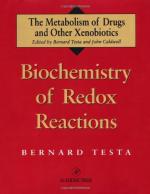|
This section contains 478 words (approx. 2 pages at 300 words per page) |

|
Oxidation-reduction reactions are significant to physiological reactions and biochemical pathways important to microorganisms and immune processes.
The term oxidation was originally used to describe reactions in which an element combines with oxygen. In contrast, reduction meant the removal of oxygen. By the turn of this century, it became apparent that oxidation always seemed to involve the loss of electrons and did not always involve oxygen. In general, oxidation- reduction reactions involve the exchange of electrons between two species.
An oxidation reaction is defined as the loss of electrons, while a reduction reaction is defined as the gain of electrons. The two reactions always occur together and in chemically equivalent quantities. Thus, the number of electrons lost by one species is always equal to the number of electrons gained by another species. The combination of the two reactions is known as a redox reaction. Species that participate...
|
This section contains 478 words (approx. 2 pages at 300 words per page) |

|


